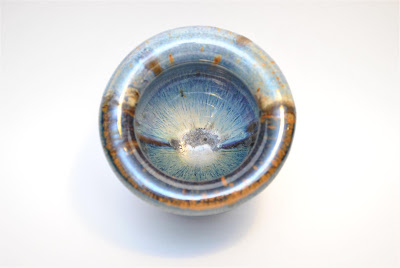Every piece this semester was made with a mix of reprocessed cone 10 clay, and glaze fired in a reduction atmosphere at approximately cone 10 (depending on placement in the rather large kiln). All dimensions are given in centimeters, measured at the maximum and rounded to the nearest half.
As usual, you'll have to forgive my overexposure (etc.), photographing glossy, colorful pottery is still beyond my point and shoot skills, and larger pictures can be accessed by clicking on the respective image.
Series: the root problem
overflowing cup no. 1
D: 11 cm, H: 8 cm
rutile blue, teadust black, Miami beach, Jed's green
note: very thin copper wire was applied prior to glaze firing; the black pool inside is presumably slag
overflowing cup no. 2
D: 10.5, H: 7
red iron slip, pink underglaze, Coleman's purple, rutile blue, angel eyes, Farrell 2-A
overflowing cup no. 3
D: 11.5, H: 10
royal blue, white and pink underglazes, rutile blue, angel eyes inside/around base, touch of moon touchups
swept bowl
D: 15.5, H: 8.5
spudomene, Jed's green, splotchy lavender
milieu vase
D: 9.5, H: 19
red iron slip, rutile blue, Jed's green, angel eyes inside/around top, Coleman's purple splashed
stacked vase
D: 11.5, H: 9.5
Coleman's purple exterior base coat, touch of moon around top, peacock around middle, purple eggshell matte around bottom; satin sky blue interior base, lipstick purple
note: some combination of glazes resulted in a fantastic iridescent blue/green around the bottom, which naturally can't be expressed adequately with a still photograph
injured bowl
D: 14.5, H: 5.5
red iron slip, rutile blue, non-iron blue celadon, teadust black spot in the center
note: the "crack" is probably better described as a tear, caused by stressing the clay through rapidly increasing the diameter while throwing
tetralobular pot
D: 11, H: 10.5
temmoku, Vegas red
collapsing pitcher
D: 10.5, H: 9.5
peacock, splotchy lavender interior, angel eyes exterior
fruitless bowl
D: 20.5, H: 8.5
graphite, spudomene, beading glaze
notes: this is my submission for the semester project, "fruit-in-a-bowl," and it is also probably the best example of the root problem produced this semester. We were requested to construct at least three pieces of fruit, but in the course of abandoning intention, I also seemed to unintentionally eschew the construction. However, as is often the case with this modus, having regained my self and taken perspective, I believe the situation has been resolved regardless, as I cannot help but see the products of this series as the fruit of my labors, since they are all very sweet indeed.
lesson learned: I was afraid that the gap between the glaze and the kiln shelf might be insufficient to prevent the bowl from attaching itself to the shelf, but the 3-5 mm gap, wide foot, and lightweight walls seemed acceptable and I really wanted to retain the sense of a footless bowl that it might be dually bottomless. As it came to pass, the bowl sagged enough to reach the shelf. Thus, fairly significant sagging is to be expected.
???
H: ? D: ?
????
notes: TBF
Series: dinnerware
plate no. 1
D: 19, H: 2
red iron slip, rutile blue, Miami beach, Farrell 2-A, angel eyes, teadust black swirl
note: from leather hard to glaze fired the diameter shrank about 1 inch (~2.5 cm)!
plate no. 2
D: 24, H: 1.5
Miami beach, Coleman's purple, Farrell 2-A, rutile blue, teadust black
note: the circles were drawn in a layer of slip on the wheel. The specifics of the drawing are an extension from my CS/math background, as this is roughly an algorithm/function I've been fascinated with and have written up a few times; the easiest way to achieve it is with a particular sine wave in polar coordinates. In this case, I just ran my finger from center to edge and back at as constant a rate as I could muster. This same procedure was used on all the plates, but with much less obvious results
plate no. 3
D: 21.5, H: 2
red iron and green slip, rutile blue, non-iron blue celadon, Coleman's purple
plate no. 4
D: 21.5, H: 2
red iron slip, pink underglaze, rutile blue, angel eyes, Jed's green
cup no. 1
D: 8, H: 9
copper chun, rutile blue, transparent and Jed's green over copper wire
cup no. 2
D: 7.5, H: 10
red iron slip, rutile blue brushed on center, Coleman's purple on base, Vegas red around top, lipstick purple inside
note: Vegas red and lipstick purple seem to mix well
cup no. 3
D: 8.5, H: 10.5
angel eyes, splotchy lavender, rutile blue, Jed's green
cup no. 4
D: 6.5, H: 13.5
purple eggshell matte, Jed's green inside, splotchy lavender on base, splashes of angel eyes
tempestuous bowl
D: 18, H: 9
ACMR and Voulkos blue slips, Vegas red around rim, turquoise and satin sky blue stripes, angel eyes, rutile blue
note: this was formed without a rib
Reflections
I am, and will be for the foreseeable future, addicted to rutile blue and angel eyes, though clearly other glaze combinations are proving potential for similar vibrance. I don't see how I could possibly stop performing pottery at this point without some significant anguish and feeling of loss.















































